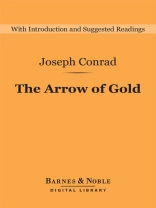This edition includes a modern introduction and a list of suggested further reading.
The Arrow of Gold is Joseph Conrad’s most romantic novel, literally a cloak-and-dagger tale set in the French port of Marseilles and the adjacent ‘sea of classic adventures.’ The principal characters are Monsieur George, a young sailor ready for love and adventure, and Doña Rita, a young woman of extraordinary wealth and beauty haunted by a mysterious threat. Supporters of a gallant but hopeless cause draw M. George into their dangerous gunrunning schemes by using Doña Rita as bait. The suspenseful story is told many years after the events in the form of a long letter from the seaman to a childhood friend. In Conrad’s classic fashion, the ‘Two Notes’ of the subtitle frame the story with multiple and clashing perspectives.
Tentang Penulis
Joseph Conrad (originally Józef Teodor Konrad Nalecz Korzeniowski) was born in the Ukraine in 1857 and grew up under Tsarist autocracy. His parents, ardent Polish patriots, died when he was a child, following their exile for anti-Russian activities, and he came under the protection of his tradition-conscious uncle, Thaddeus Bobrowski, who watched over him for the next twenty-five years. In 1874 Bobrowski conceded to his nephew’s passionate desire to go to sea, and Conrad travelled to Marseilles, where he served in French merchant vessels before joining a British ship in 1878 as an apprentice.
In 1886 he obtained British nationality and his Master’s certificate in the British Merchant Service. Eight years later he left the sea to devote himself to writing, publishing his first novel, Almayer’s Folly, in 1895. The following year he married Jessie George and eventually settled in Kent, where he produced within fifteen years such modern classics as Youth, Heart of Darkness, Lord Jim, Typhoon, Nostromo, The Secret Agent and Under Western Eyes. He continued to write until his death in 1924. Today Conrad is generally regarded as one of the greatest writers of fiction in English — his third language. He once described himself as being concerned ‘with the ideal value of things, events and people’ in the Preface to The Nigger of the Narcissus he defined his task as ‘by the power of the written word … before all, to make you see.’
Author biography courtesy of Penguin Group (USA).












